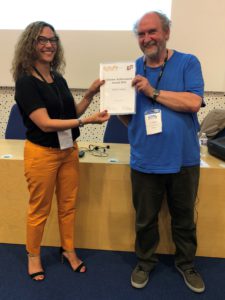IISI-EUSSET Lifetime Achievement Award 2018 to Dave Randall.

Laudatio
Dave Randall was born in the West Country in the UK in 1950 in a working-class family – his father was a welder – and he was one of 6 children. He graduated from the University of Kent at Canterbury with a degree in sociology in 1971 and got a postgraduate certificate of education from Keele in 1973. After this he spent many years working as a schoolteacher. However, being more than ready for a change, he pounced on an opportunity to do a masters course at Lancaster University in 1988, which he passed with distinction. It was at this time that he made the acquaintance of John Hughes, who readily spotted his talents, and he went on to become one of the key members of the Lancaster School of CSCW. During his time at Lancaster he was involved in some of the great formative studies in CSCW, producing papers that have become cornerstones of the literature. He worked on the original Air Traffic Control studies and was also one of the researchers involved in a range of influential studies of retail banking. Through his involvement in the work at Lancaster, he became one of the key figures involved in working out how ethnography might contribute to the design community, something he has been building upon ever since. In 1992 he was offered the chance to take a full-time position as a lecturer at Manchester Metropolitan University, where he stayed until 2011. When Dave retired from this position he remained extremely active in the community, taking on a Senior Professor position at the University of Siegen almost immediately, as well as a Visiting Professorship at Linnaeus University in Sweden, and a range of consultancy contracts across Europe, in Brazil and in Japan.
Dave has published and co-authored a number of excellent books including Retail Finance and Organisational Change, Fieldwork and Design, and a recent book critiquing rational choice theory entitled Choice. He also played a key role in bringing together the series of essays contained in another recently published book entitled Socio-informatics – on the use and design of IT artefacts. He has written and published an impressively large number of journal and conference papers, reports, and book chapters, putting most of his colleagues to shame. Nor are these incidental and low-level papers. Many of them have been profoundly influential and have served to shape research agendas, including his work on organizational memory and, most particularly, his extensive oeuvre that examines the role of ethnography in design. He has also served on numerous conference programme committees as an AC, an SC or a chair. And all of this is aside from the huge volume of work he’s done as a reviewer and an editor along the way. Together with Mark Rouncefield and Richard Bentley he systematically ran tutorials on the use of ethnography at CSCW and ECSCW from 1992 to 1999 and has continued to provide such tutorials and masterclasses to the community ever since. And none of this begins to touch the role he has played as a lecturer over the years. Dave has a lively intellect and he’s interested in virtually everything. He has a phenomenal capacity to listen to anyone and send them away feeling better about what they are doing and he exhibits a tireless attention to bringing people on. He is a natural pedagogue with a remarkable ability to engage students, but his particular gift is to engage people in seemingly incidental, but profoundly inspirational conversations. Numerous people have benefited from his advice over the years and long may they continue to do so.

